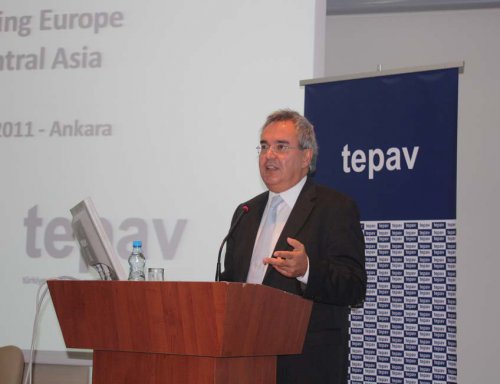TEPAV Director Sak Cited TÜBA as an Example of an Innovative Ecosystem Stating that an innovative ecosystem could be established in an environment in which different actors focus on a single target without interfering with others’ space, Sak addressed the recent law amendment that ended the autonomy of the Turkish Academy of Sciences (TÜBA).

ANKARA – TEPAV and the World Bank organized a dissemination meeting on the report “Igniting Innovation: Rethinking the Role of Government in Emerging Asia and Central Asia” on October 18, 2011. Delivering the opening speech, TEPAV Director Güven Sak said that in order to establish an innovative ecosystem, different actors should act jointly without interfering with others’ space. In this context, he addressed the recent developments by which the autonomy of the Turkish Academy of Sciences (TÜBA) had been ended. “Politicians should not interfere in the way science is done,” he said.
“The public sector must define its functions well”
Sak stated that Turkey is now in a different phase with its targets and development level and said, “We cannot enable dynamic growth with the attitude of an average student.” He stressed that it was necessary, on the one hand, to establish an innovation ecosystem in which the relevant actors fulfilled their functions in the best way possible and acted in cooperation to reach a common goal, on the other. The skill necessary here was that these actors ensure coordination without interfering with each others’ spaces. The functions of the public sector that would undertake the role of ensuring coordination had to be well defined. Sak added that innovation can advance only in a “peaceful” environment.
“The essential element is not a domestic automobile but R&D expenditures”
Ulrich Zachau, World Bank Country Director for Turkey, said that the global crisis had validated once again the key importance for emerging market economies like Turkey of sustainable models that improve productivity and require less foreign finance. Highlighting in this context the significance of innovation that improves productivity and prosperity, Zachau commented on the recent debate on manufacturing domestic automobiles. He stressed that the essential element here was not manufacturing domestic automobiles, but the level and efficient use of R&D expenditures. Turkey had accomplished an improvement in increasing the share of R&D expenditures (currently 1 percent of GDP) whereas countries like China and South Korea had moved the ratio to the 3-5 percent level. He also stressed the share of the private sector in R&D funds.

Following the opening speeches, a panel section was held with the moderation of Esen Çağlar, TEPAV Economic Policy Analyst. Speaking during the panel session, Gerardo Corrochano, World Bank Europe and Central Asia Private Sector Development Sector Director maintained that the report recommended the following steps to ignite innovation in the region:
- Supporting the collaboration of local researchers and foreign inventors—and attracting foreign R&D investment,
- Restructuring research and development institutes,
- Rethinking financial support instruments, and
- Facilitating trade, FDI and entrepreneurial start-ups and spinoffs.
John Gabriel Goddard, economist at the World Bank Europe and Central Asia Financial and Private Sector Development Sector, stated that Turkey was one of the strong countries of the region, raising hopes for the future.
“We are to talk about private sector R&D”
Çağlar said, “We are in a period in which we are to talk about private sector R&D, in which private sector R&D will be important.” He stressed that it should be decided whether large companies or SMEs would conduct R&D activities, how companies would be connected with international networks and in which provinces innovation would take place.
The meeting ended after the question-answer session with the participation and comments of the audience.
Please click here for the World Bank report.














